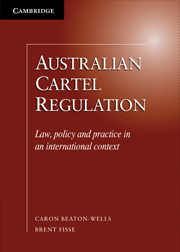Book contents
- Frontmatter
- Contents
- About the authors
- Preface
- Acknowledgements
- Abbreviations
- 1 Introduction
- 2 The legal framework governing cartel conduct
- 3 Collusion (contracts, arrangements, understandings)
- 4 Cartel and other provisions
- 5 Fault elements of the cartel offences
- 6 Individual liability for cartel conduct
- 7 Corporate liability
- 8 Exceptions
- 9 Enforcement policy
- 10 Immunity and cooperation policies
- 11 Sanctions
- 12 Compliance and liability control
- 13 Conclusion
- Appendix Trade Practices Act 1974 (Cth) Pt IV Div 1; Pt IV Div 2 s 45
- Index
5 - Fault elements of the cartel offences
Published online by Cambridge University Press: 05 December 2011
- Frontmatter
- Contents
- About the authors
- Preface
- Acknowledgements
- Abbreviations
- 1 Introduction
- 2 The legal framework governing cartel conduct
- 3 Collusion (contracts, arrangements, understandings)
- 4 Cartel and other provisions
- 5 Fault elements of the cartel offences
- 6 Individual liability for cartel conduct
- 7 Corporate liability
- 8 Exceptions
- 9 Enforcement policy
- 10 Immunity and cooperation policies
- 11 Sanctions
- 12 Compliance and liability control
- 13 Conclusion
- Appendix Trade Practices Act 1974 (Cth) Pt IV Div 1; Pt IV Div 2 s 45
- Index
Summary
Introduction – the cartel offences and their physical and fault elements
A prime feature of the new Australian anti-cartel legislation is the criminalisation of cartel conduct. As discussed in Chapter 2, two new offences are created: (a) making a contract or arrangement, or arriving at an understanding, containing a cartel provision; and (b) giving effect to a cartel provision contained in a contract, arrangement or understanding. These are serious offences; for individual offenders they carry a maximum jail term of 10 years.
The physical elements of the cartel offences are the same as those of the civil prohibitions against price-fixing, reduction of output, market allocation and bid-rigging. The physical elements are as discussed in Chapters 3 and 4 above. The present chapter does not retrace that analysis.
The prime distinguishing substantive feature of the cartel offences is that they have additional fault elements. These additional fault elements are essentially:
for the offence of making a contract or arrangement, or arriving at an understanding, containing a cartel provision, intention to make a contract or arrangement, or to arrive at an understanding, and knowledge or belief that the contract, arrangement or understanding contains a cartel provision
for the offence of giving effect to a cartel provision, knowledge or belief that a cartel provision is contained in a contract, arrangement or understanding, and intention to give effect to the cartel provision.
The fault elements of the civil cartel prohibitions may be contrasted as follows. First, the default fault element of intention under the Criminal Code does not apply to the conduct element of making a contract or arrangement or arriving at an understanding (s 44ZZRJ(1)) or giving effect to a cartel provision (s 44ZZRK(1)). However, the elements of consensus and commitment required for a contract, arrangement or understanding are each tantamount to an intention to agree. Second, it is irrelevant to liability under the civil prohibitions whether or not D knew or believed that the contract, arrangement or understanding contained a cartel provision or an exclusionary provision, or a provision that had the purpose, effect of likely effect of substantially lessening competition.
- Type
- Chapter
- Information
- Australian Cartel RegulationLaw, Policy and Practice in an International Context, pp. 135 - 157Publisher: Cambridge University PressPrint publication year: 2011



